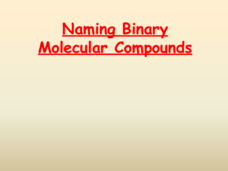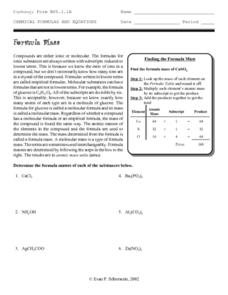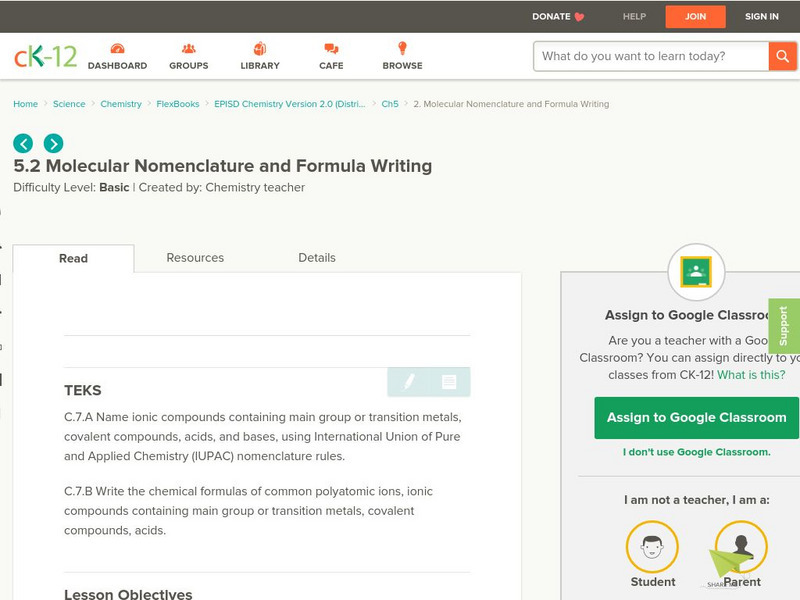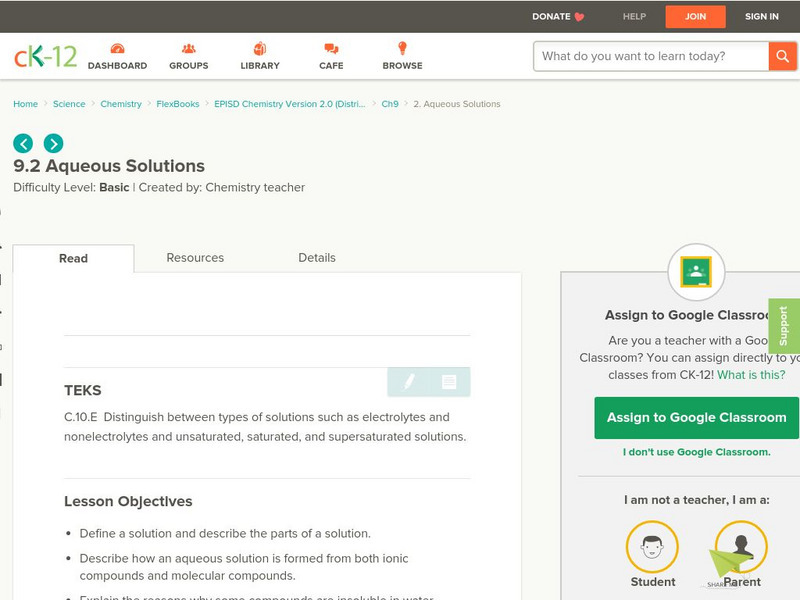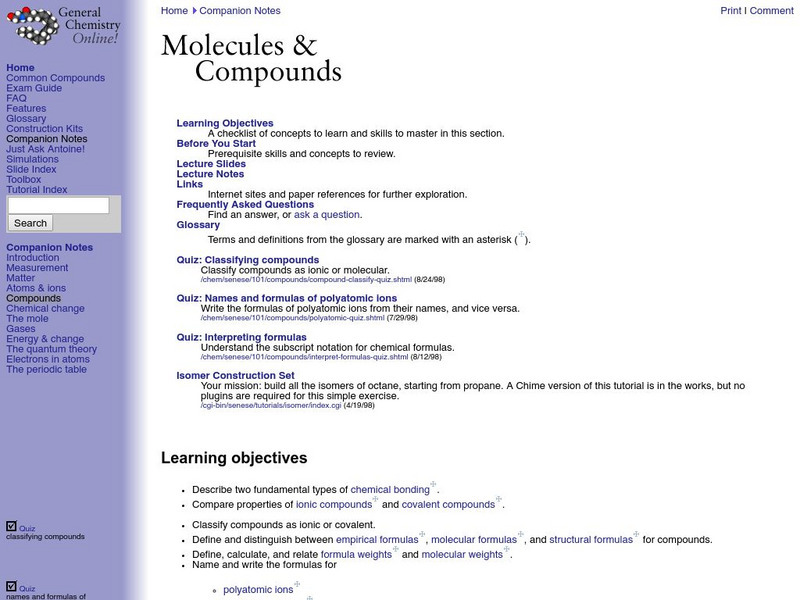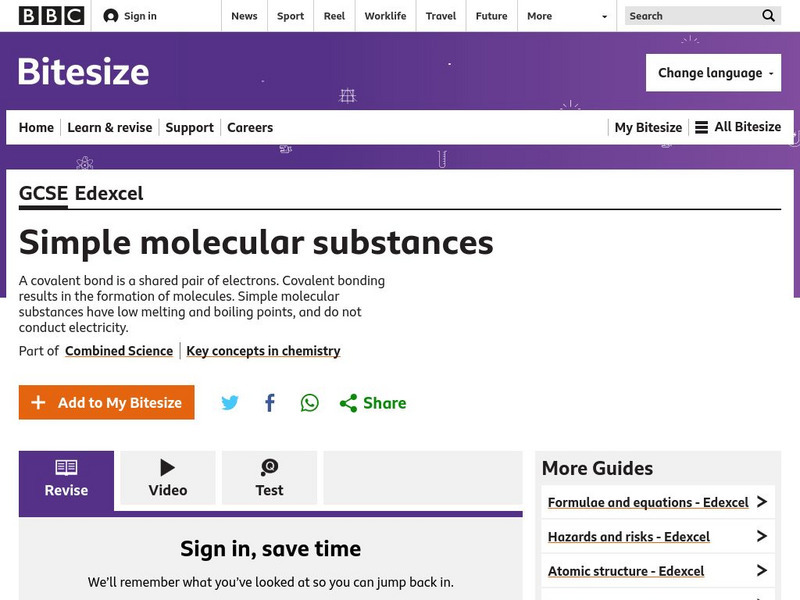Beyond Benign
Synthesis and Analysis of Biodiesel
Fossil fuels are non-renewable resources and have become crucial to the livelihood of countless individuals. Young chemists investigate an alternative method of generating energy by performing a series of activities that lead to the...
Curated OER
Review of Ionic and Covalent Compounds and Transitioning from Ionic to Covalent Compounds
Here is a unique assigment: compare and contrast ionic and covalent compounds in an extensive data table and then analyze Lewis dot structures in antoher. Three columns are to befilled in: "characteristic or feature," "applies to ionic...
Learning Games Lab
Understanding Water Activity
How does water activity play a role in food spoilage? First, the learners think about which types of foods would be best to take on a backpacking trip based on the water activity of different foods. It then walks through why water...
Royal Society of Chemistry
Complex Ion Shapes
Things are really shaping up! Provide young chemists with polyatomic ion practice using an interesting interactive. Individuals complete puzzles focused on molecular geometry and complex ions.
Science Geek
Naming Binary Molecular Compounds
She has been reading that book about helium all day; she just can't put it down! Presentation begins with the rules for naming binary molecular compounds using prefixes and suffixes. After a list of prefixes for review, it offers guided...
Aquarium of the Pacific
Lego Molecules
Young scientists construct an understanding of molecular compounds in this hands-on science lesson plan. Using LEGO® to model the atoms of different elements, students build molecules based on the chemical formulas of common compounds.
National Science Teachers Association
Ionic Molecular
Twelve compounds are named and each of their chemical formulas are printed on individual cards. Chemistry pupils place each beneath an Ionic or Molecular card, depending on which type of compound is represented.
Curated OER
WS 7.1.3 Molecular and Ionic Compounds
In this compounds activity, students name ionic and molecular compounds given their formulas. They also write the formulas for molecular and ionic compounds given their names.
Curated OER
Binary Compounds
Binary compounds are explained with the periodic table, atomic charges, and examples. Viewers are taught to name binary compounds and then are presented with a chart of cations and ions. Finally, they see a few photos of forms of silicon...
Curated OER
Lattice Energy
A few basic facts about lattice energy are listed at the top of the page, including the formula used for calculations. Two charts follow: one for lattice energy and another for ion sizes. There is no work to do on this handout, but it...
Curated OER
Nomenclature Review
For this nomenclature worksheet, learners are given the formulas for ionic compounds, molecular compounds and inorganic acids and they write their names. They also write the formulas given the names of ionic compounds, molecular...
Curated OER
Naming Molecular Compounds
In this naming molecular compounds learning exercise, high schoolers are given 8 formulas of molecular compounds and they write the names for each. Students are then given 8 names of molecular compounds and they write the formula for each.
Curated OER
The Ties that Bind
In this bonding worksheet, students read about the types of bonds that hold compounds together. They are given fifteen common materials and they identify the types of bonds that hold each together.
Curated OER
Formula Mass
In this formula mass worksheet, students read about molecular substances and their formula masses. They find the formula masses for six compounds using the atomic masses of its elements.
Curated OER
WS 7.1.1 Molecular Compounds
In this molecular compounds worksheet, students write the prefixes for the numbers one through ten. They name thirty compounds given their formulas. They write the formulas for twenty six compounds given their names.
Curated OER
Naming Inorganic Compounds
In this compounds worksheet, students read about the rules for naming inorganic compounds. Then students complete 2 graphic organizers by filling in the compound name, formula, and anion name.
Curated OER
Naming Inorganic Compounds
In this compounds activity, students review how to name inorganic compounds and then complete 2 graphic organizers naming the cations and anions.
Curated OER
Molecules Research Question
In this molecules worksheet, students research a substance that is made up of molecules with two or more elements. Students name the substance, write a short description of the substance, and draw a picture that illustrates the substance.
Chiral Publishing
Chiral Publishing: An Introduction to Chemistry: Types of Compounds
Discover different types of compounds such as binary covalent, binary ionic, binary acids, and oxyacids. Explore links that give information about writing names and formulas for different compounds.
CK-12 Foundation
Ck 12: Molecular Compounds
[Free Registration/Login may be required to access all resource tools.] In the following online tutorial students will name ionic compounds containing main group or transition metals, covalent compounds, acids, and bases, using...
CK-12 Foundation
Ck 12: Aqueous Solutions
[Free Registration/Login may be required to access all resource tools.] In the following online tutorial students will define a solution and describe the parts of a solution. They will describe how an aqueous solution is formed from both...
Frostburg State University
General Chemistry Online: Molecules and Compounds
A complete lesson on compounds, from introductory material in the beginning to a practice exam at the end. This lesson covers bonding, ionic compounds, molecular compounds, naming compounds, structural formulas, polyatomic ions, and much...
Chiral Publishing
Chiral Publishing: An Introduction to Chemistry: Molecular Compounds: Audio Book
Learn all about molecular structures in this easy-to-understand, audio book. See how valence electrons determine how atoms bond together, and look at the bonding inside some of the most common molecules around you.
BBC
Bbc: Gcse Bitesize: Covalent Bonds
A covalent bond is formed between non metal atoms, which combine together by sharing electrons. Covalent compounds have no free electrons and no ions so they don't conduct electricity.






